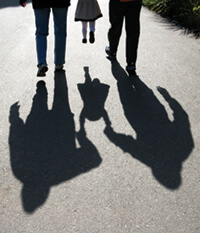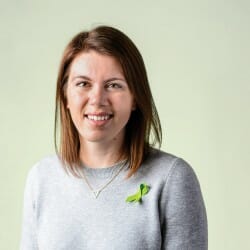Family Matters

Harry Brighouse’s philosophy course asks students to wrestle with complex issues, including the case for and against same-sex marriage. ISTOCK photo.
To drive a car, you need to pass a test and have a license. Although there is no similar requirement to have a baby, should there be?
It’s the sort of interesting question that students debate regularly in Philosophy 104: Childhood, Marriage, and Family, one course within a First-Year Interest Group that is exploring children and families. The group contemplates complex questions surrounding family structure, society’s responsibilities toward children, and the role of government in marriage and in protecting and educating the young.
Licensing parents is a concept that typically generates some of the most animated discussions, says Harry Brighouse, a UW philosophy professor who teaches the course. “Students who read it the first time think it’s appalling, and by the time they finish [the discussion], they’re in favor of it,” Brighouse says. “It’s one of those things where students’ minds get changed in sort of surprising ways.”
The syllabus puts it best: “This course requires a lot of thinking.”
The twenty freshmen in Brighouse’s class wade through ideas and issues they will confront at some point in their lives: what makes for a good childhood, the case for and against same-sex marriage, and who is responsible for rearing children. Students take companion courses in sociology and educational psychology that cover marriage, family, and childhood development. They also read material that wouldn’t typically be part of a philosophy class, because Brighouse believes they can’t be expected to be knowledgeable enough about this course’s subjects to reflect philosophically from the get-go.
“They have very similar experiences of childhood to one another,” he says. “One of the things I try to get them to do is read literature — historical and sociological literature — in which it’s made clear to them there are very different kinds of childhoods than [those] they experienced.”
At the very start of the course, Brighouse gets students thinking about marriage and family through a survey that asks whether they expect to have children. To those who answer yes, he follows up: “Which parent do you expect to spend the most time, energy, and effort raising the children?” He then asks the students to consider the same question for their five best friends.
He has asked hundreds of students these questions, and the results are always the same: Female students overwhelmingly think they’ll raise their children more or less equally with their spouses, while male students overwhelmingly think that the mothers will do most of the childrearing. And when it comes to their friends having children, both male and female students think the mother will bear more of the parenting responsibilities.
The questions reveal to female students the dissonance between their views of themselves and their friends when it comes to parenting. “In other words, you’re being totally unrealistic about yourselves,” Brighouse tells the mostly female class after sharing the results. “The boys know exactly what the game is. The girls don’t.”
Brighouse has two overarching goals for his students as they walk through these minefields of controversial topics: to be able to reason, and to understand how other people who go through the same process may end up disagreeing with them.
“I have no interest in having them walk away from my class with the same views I have,” he says. “I want them to think carefully about the moral questions that face them as ordinary people in their personal lives and in their lives as citizens.”
The small class size creates an atmosphere in which students are more likely to share their thoughts and opinions, Brighouse says. “By the end of the semester, you’ve seen them change and develop,” he says. “That’s what educating is; that’s what makes educating rewarding — not going in and saying the same thing over and over again, but actually observing people learning and developing.”
Published in the Winter 2010 issue



Comments
No comments posted yet.